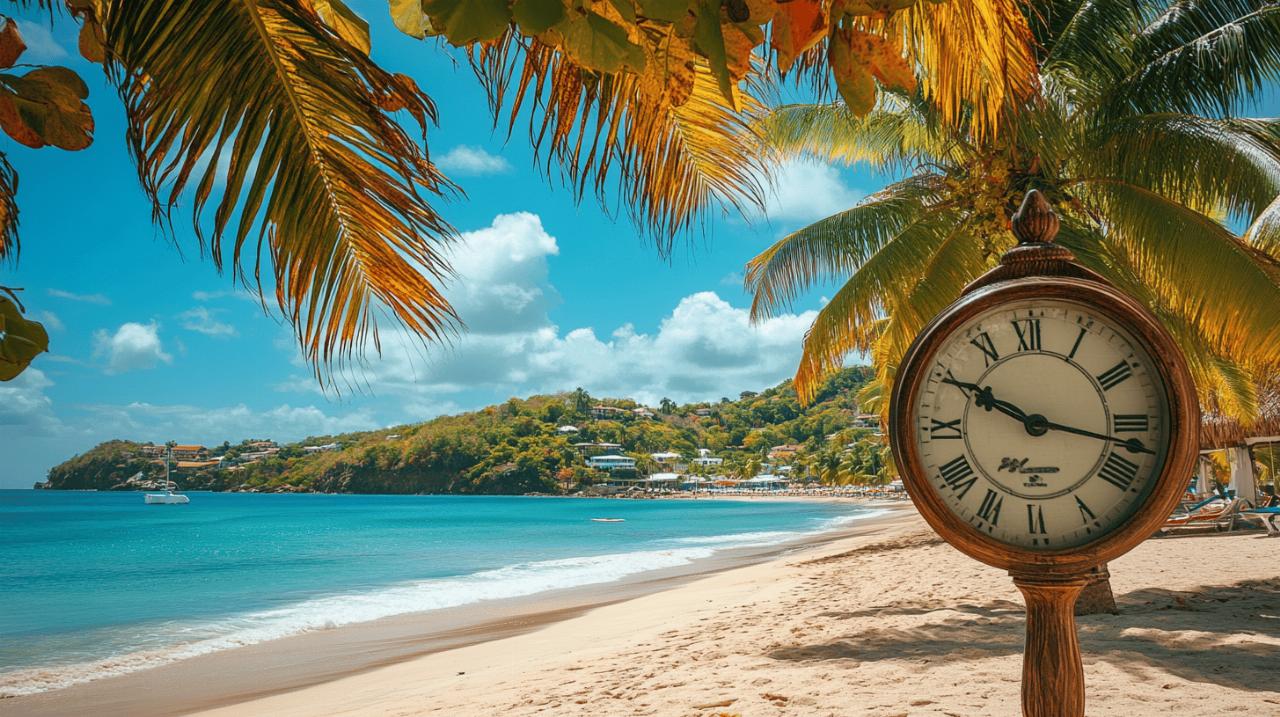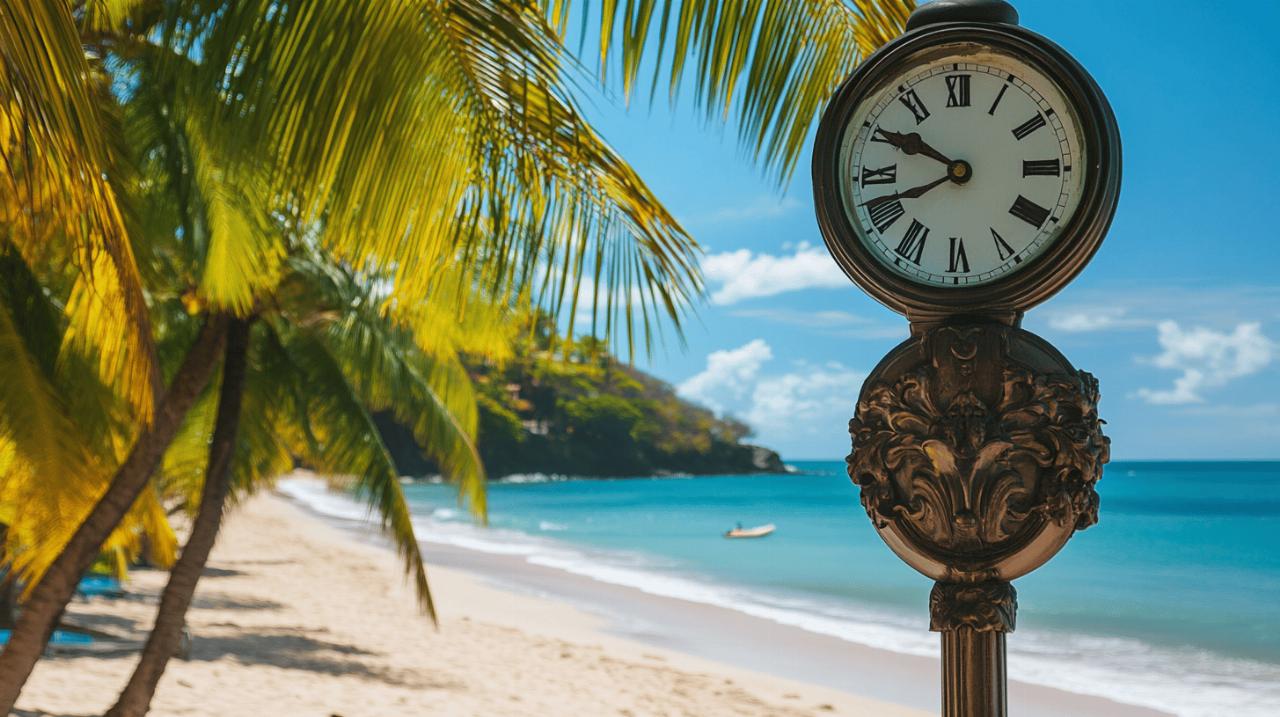Navigating Maritime Time Zones: What the Time Difference Between Martinique and France Means for Your Caribbean Holiday
Planning a trip to the Caribbean often involves more than just choosing the right beach or booking a charming guesthouse. One aspect that can easily slip under the radar is understanding how time zones affect your travel plans. When you're jetting off from the UK to Martinique, a stunning French overseas territory nestled in the heart of the Caribbean, the clock won't tick quite the same way as it does back home or in mainland France. Grasping the time difference between Martinique and France is essential for coordinating flights, staying in touch with loved ones, and making the most of every sun-soaked moment on this beautiful island.
Understanding the Time Difference: Martinique vs Metropolitan France
Martinique operates on Atlantic Standard Time, which is UTC-4 throughout the entire year. Unlike many regions around the globe, the island does not observe daylight saving time. This means that the clocks in Fort-de-France remain steady, providing a consistent reference point for travellers and locals alike. On the other hand, mainland France follows a different rhythm. During the winter months, Paris and other French cities sit at UTC+1, which creates a straightforward five-hour gap between the two locations. When it's midday in Paris, the tropical breezes of Martinique are still welcoming the morning at seven o'clock.
Winter hours: the five-hour gap explained
During the colder months, when European streets are often shrouded in grey skies and early sunsets, the time difference between Martinique and France is at its most manageable. With France on UTC+1 and Martinique holding steady at UTC-4, the five-hour gap is easy to remember. This separation is particularly useful when planning phone calls or virtual catch-ups with family and friends. If you're lounging by the beach in Martinique at three in the afternoon, your mates back in Paris are likely winding down their workday at eight in the evening. This window can be quite convenient for staying connected without disturbing anyone at an ungodly hour.
Summer adjustments: when daylight saving changes everything
Come the warmer months, France shifts to UTC+2 as daylight saving time takes effect. This adjustment extends the time difference to six hours. While the change might seem minor, it can have a noticeable impact on your schedule. For instance, if you're planning a business call or a video chat with someone in Paris during your holiday, you'll need to account for that extra hour. When the sun is high over Martinique at noon, it's already six in the evening in the French capital. This shift is worth bearing in mind, especially if you're coordinating activities or trying to catch a live event broadcast from Europe.
Practical implications for your caribbean getaway
Understanding the time difference is not just an academic exercise. It has real-world implications that can enhance your travel experience or, if overlooked, lead to minor inconveniences. Whether you're booking flights, arranging ferries to nearby islands, or simply trying to stay in touch with colleagues and family, being aware of the clock can save you from unnecessary stress. The consistent time zone in Martinique, combined with the predictable shifts in France, makes planning easier once you've got the hang of it.
Coordinating flights and ferry bookings across time zones
When you're booking your journey from the United Kingdom or France to Martinique, it's crucial to double-check the local times for departures and arrivals. Airlines and ferry operators list schedules in local time, so a flight leaving Paris at eight in the morning might land in Fort-de-France at what feels like early afternoon according to your body clock, but it's actually just past eight in the morning locally due to the time difference. This can affect your plans for the rest of the day, especially if you've arranged transfers or accommodation check-ins. Always convert times carefully and allow yourself a buffer to avoid any last-minute scrambles.
Staying Connected: Ringing Home at the Right Moment
One of the joys of a Caribbean holiday is the chance to disconnect and unwind, but most of us still want to share our adventures with those back home. Knowing the best time to call can make all the difference. If you're in Martinique and want to reach someone in France without waking them up or catching them at a busy moment, aim for late morning to early afternoon in the Caribbean. Between nine in the morning and midday in Martinique, it's between three and six in the evening in France during the summer months, which is often a pleasant time for a leisurely chat. In winter, the same window aligns with two to five in the afternoon, still a reasonable time for most people.
Making the Most of Martinique's Time Zone During Your Stay
 Once you've arrived on the island, the steady time zone offers a sense of continuity that can help you settle in more quickly. Without the disruption of daylight saving time, your daily routine can follow a natural rhythm dictated by the tropical sun rather than the ticking of a clock. However, adjusting to a new time zone, even one as straightforward as Atlantic Standard Time, can still take a bit of effort, especially if you're arriving from Europe or the UK.
Once you've arrived on the island, the steady time zone offers a sense of continuity that can help you settle in more quickly. Without the disruption of daylight saving time, your daily routine can follow a natural rhythm dictated by the tropical sun rather than the ticking of a clock. However, adjusting to a new time zone, even one as straightforward as Atlantic Standard Time, can still take a bit of effort, especially if you're arriving from Europe or the UK.
Adjusting your body clock: tips for beating jet lag
Jet lag can be a nuisance, but there are strategies to ease the transition. Start by adjusting your sleep schedule a few days before you depart. If you're travelling from the UK, try going to bed an hour or two earlier each night in the lead-up to your trip. Once you land in Martinique, resist the temptation to nap excessively during the day, even if you're feeling drowsy. Instead, spend time outdoors soaking up the sunshine, which can help reset your internal clock. Staying hydrated and eating light, balanced meals can also support your body's adjustment. By the second or third day, you should find yourself falling into the local rhythm with ease.
Planning daily activities around the time difference
With the time difference in mind, you can structure your days to maximise both relaxation and productivity. Mornings in Martinique are perfect for beach outings, hikes through lush rainforests, or exploring the vibrant markets of Fort-de-France. If you need to handle any business matters or coordinate with contacts in France, late morning to early afternoon is ideal, as it corresponds to late afternoon or early evening in Paris. This leaves your evenings free to enjoy the island's renowned cuisine, attend cultural events, or simply watch the sun dip below the horizon with a rum punch in hand.
Essential Time Zone Tips for the Savvy Traveller
For those who need to maintain a connection with work or other obligations while on holiday, understanding the time difference is even more critical. Martinique's consistent time zone can actually be an advantage, as it provides a stable reference point for scheduling. With a little planning, you can balance leisure and responsibility without letting one overshadow the other.
Scheduling Business Calls and Virtual Meetings from Paradise
If you're the type who can't fully switch off, even in paradise, then setting clear boundaries around work hours is key. A good rule of thumb for scheduling calls between Martinique and France is to aim for mid-afternoon in France, which falls in late morning or early afternoon in Martinique. This timing respects both parties' schedules and avoids the awkwardness of early morning or late evening interruptions. Tools like world time zone converters can be invaluable, allowing you to see at a glance what time it is in Paris, London, or any other relevant location. Many websites offer widgets that you can add to your phone or laptop for quick reference.
Understanding utc-4: what it means for your holiday itinerary
Atlantic Standard Time, or UTC-4, is shared by several regions, including parts of Canada such as Quebec. This consistency can be reassuring if you're coordinating travel across multiple Caribbean destinations or linking up with other travellers in the region. Knowing that Martinique operates on UTC-4 year-round means you can plan with confidence, whether you're booking excursions, arranging meet-ups, or simply checking the local time for a ferry departure. The absence of daylight saving time eliminates the confusion that can arise in other parts of the world, making Martinique a straightforward choice for those who value simplicity in their travel logistics. With this knowledge in your back pocket, you're well-equipped to navigate the time difference and make the most of every precious moment on this enchanting island.
